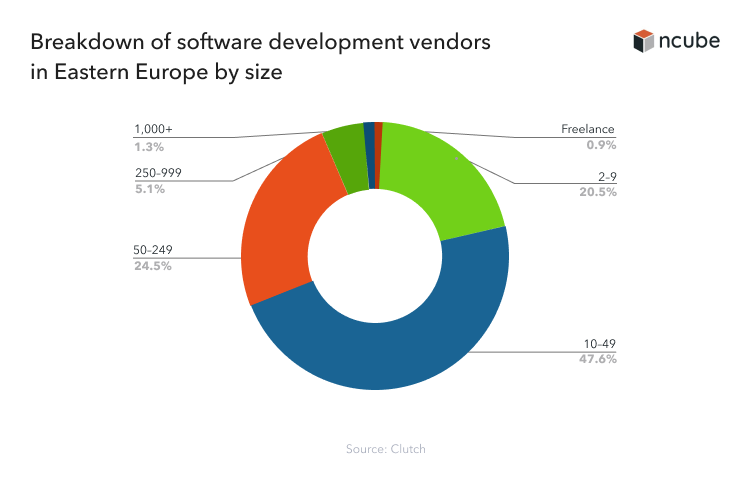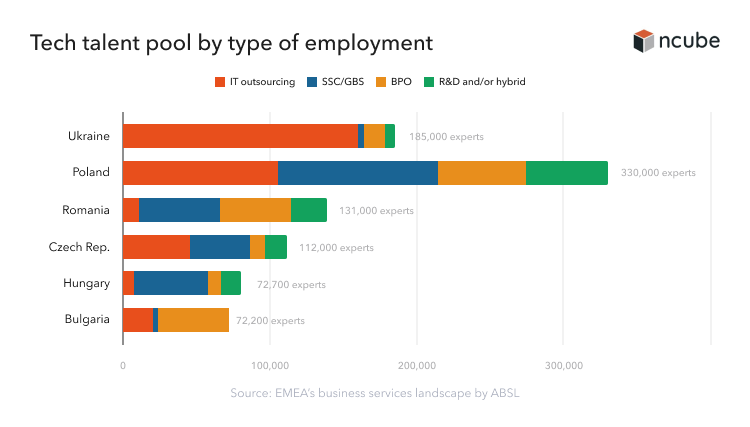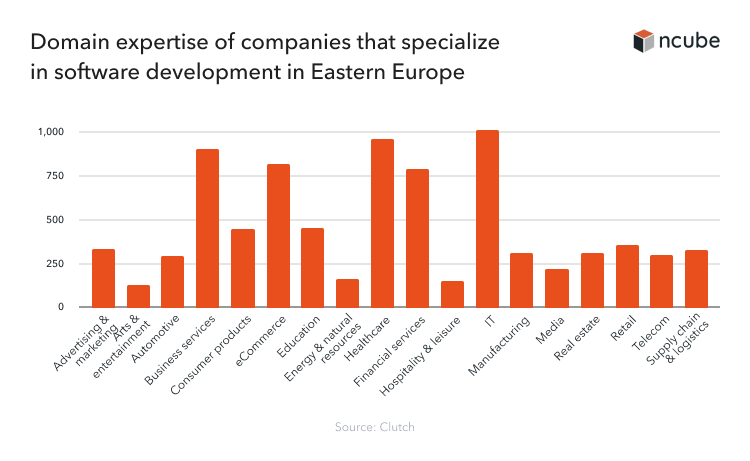
Why opt for a Software Outsourcing Company in Eastern Europe?

Eastern Europe has always been an IT powerhouse for many tech leaders and global companies. Such giants as Microsoft, Skype, IBM, and many others have chosen development in Eastern Europe as a part of their strategy. That’s because Eastern Europe is known for the quality of services, unique expertise, and availability of experts.
IT outsourcing is also one of the largest service export areas for many Eastern European companies. In this article, we will highlight the major reasons why you should partner with software vendors from Eastern Europe.
A variety of vendors to choose from
Clutch lists a little over 2,700 companies that provide software development services in Eastern Europe: 30% of these companies are midsize and large vendors, and almost 60% are smaller companies with just 2 to 49 employees.

Please note that top software development companies in Eastern Europe aren’t necessarily the largest ones. Often, smaller vendors have more niche expertise, and thus are more likely to have an in-depth understanding of your specialty.
It is also worth mentioning that many of the top software development companies in Eastern Europe are recognized by the industry standards such as the Global Outsourcing 100 by IAOP or Global Sourcing Association (GSA). Many of them also have recognition from niche organizations. Often, these companies are praised for the quality of their services and depth of technical expertise.
A large tech talent pool with lower competition
Eastern Europe is well-known for its vast tech talent pool composed of skilled engineers, high English proficiency, and overall IT outsourcing background.
The combined tech talent pool of this region exceeds 1.3M specialists. On the chart below you can find data about the countries that are home to the largest number of experts. Ukraine, Poland, and Romania are the absolute leaders in the number of engineers. Poland is the leading destination in Eastern Europe with over 300,000 specialists.
However, EMEA’s business services landscape report offers a different perspective. If we take a look at the general breakdown of these companies by their business services, we will see that many of the experts are working for Business Process Outsourcing (BPO) and Global Business Services (GBS) companies, thus they are not available if you are interested in IT outsourcing. In other words, if we count the absolute number of people that are working for IT outsourcing, IT outstaffing, and software development in Eastern Europe, Ukraine will be the region’s leader.

While on the subject of availability of the tech talent, please note that the competition for IT experts in the region is much lower compared to the US or the UK, as there are fewer global leaders in the region. Why does it matter? This directly affects the time-to-hire time: With less intense competition in the labor market, you can build a team of specialists faster and easier.
Wide domain expertise
You have more chances to succeed if the vendor you choose has expertise in your domain. It helps them understand your business needs better and warn you about any potential risks or bottlenecks.

If we analyze the domain expertise of software development companies in Eastern Europe, many companies have experience in delivering services for IT, eCommerce, healthcare, and financial services. However, we should also note that there are also vendors with narrower expertise, such as automotive, energy & resources, or supply chain industries.
European standards of education
First of all, all countries in the region boast an extremely high literacy rate that ranges between 97% and 99.5%. In many Eastern European countries, higher education is much more affordable than in the US or Western Europe. Many universities have governmental programs, thus providing free education. Some experts are even holders of a Ph.D. degree. Some schools in the region are even featured in the World University Rankings by Times Higher Education.
Time zone benefits
Eastern Europe software development outsourcing offers a favorable time window to synchronize collaboration with US and Western European businesses. This guarantees easier communication between the local unit and remote development team – you can hold your meetings, status updates, and discussions without playing havoc on your schedule. This time zone advantage minimizes response delays and enhances overall efficiency in project management.
Cultural compatibility
Software outsourcing in Eastern Europe ensures you will have common ground with your remote squad. The countries in this region are in close proximity to Western Europe with cultural ties to EU countries. This benefit facilitates no-barrier collaboration and reduces chances for potential misunderstandings that may stem from cultural differences among team members.
Cost-effectiveness
Software outsourcing in Eastern Europe is one of the most lucrative in the world when it comes to pricing, with a range of offshore software programming rates. According to Accelerance, software outsourcing companies in Eastern Europe charge from $21 to $118 per hour. According to Clutch.com, an aggregator of offshore software development firms, the average hourly rate for software development in Ukraine, the Czech Republic, Bulgaria, Romania, and Moldova falls within the range of $25-$49, excluding taxes and fees associated with the provider. In Poland and Hungary, these companies typically charge between $50-$99 per hour for the services of a developer. This cost advantage can be an attractive option for companies looking to optimize their budgets without compromising on quality.
Strong focus on innovation
The region is known for its strong academic institutions and research centers that produce highly skilled graduates in various technical fields. This emphasis on innovation translates into the software development industry, where software outsourcing companies in Eastern Europe stay at the forefront of the latest technologies and trends. This way, as a client, you can count on cutting-edge solutions.
Flexible cooperation models
Software outsourcing companies in Eastern Europe typically offer flexible engagement models tailored to the specific needs of their clients. Whether you require a dedicated team, staff augmentation, or full-cycle product development, you’ll find a suitable vendor to meet your business objectives.
How to choose a software vendor in Eastern Europe
Scrolling down a list of software vendors in Eastern Europe and can’t make up your mind? We understand that making such a huge decision can be hard. If you are looking for a software outsourcing company in Eastern Europe, there are 5 things you should keep in mind.
- Define your needs. Outline your business needs and selection criteria for a potential partner.
- Shortlist the pool of software vendors. Make a list of potential software vendors and filter it based on your selection criteria.
- Choose a company of the right size. Pay attention to the size of the firm, as it will help you narrow down the initial list of potential vendors. If you have a complex project, it’s best to avoid small companies (ones under 20 people), as they are less likely to have enough resources to scale your team fast.
- Analyze the company’s tech portfolio. Opt for software vendors that not only provide the services you need but also have a proven track record of successful projects.
- Opt for vendors with an understanding of your domain. Having a tech partner with an in-depth knowledge of your industry helps set the solid ground for the overall success of the project. For example, companies that have solid expertise in fintech are more likely to help you implement industry-related standards and solve tech challenges successfully.
- Check their client list. Can you find software vendors similar to yours (in terms of size, services, or domain)? What type of projects have they handled?
- Assess their communication and involvement. How quickly did they respond? Do they seem interested in your project? Are there any inconsistencies in their communication? Evaluate all of the above-mentioned criteria and make the right decision.
Why should nCube be your software outsourcing company of choice in Eastern Europe?
- nCube has 14+ years of experience in IT staff augmentation and software development.
- We are partners with companies like AstraZeneca, doTerra, Life360, and many others, helping them to bring their business to the next level.
- Our technical expertise includes Java, .NET, Python, JavaScript, iOS, Android, as well as IoT, Artificial Intelligence, IoT, Blockchain, and Data Science.
Recommended articles


